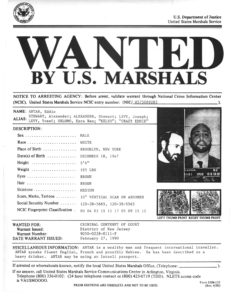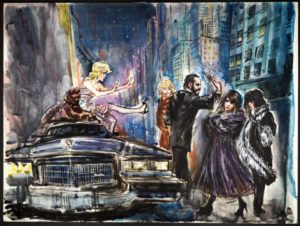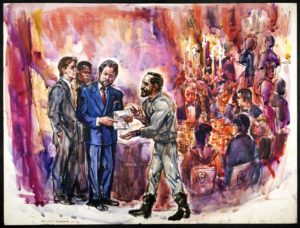
Eddie Antar’s success sparked jealousy among his relatives
Crazy Eddie was under the tight control of Eddie Antar and his father Sam M. Antar, who co-founded the company. The downfall of Crazy Eddie resulted from internal conflicts, resentments, and power struggles among family members.
The original company that preceded Crazy Eddie was ERS Electronics. It was established in 1969 by Eddie Antar, Sam M. Antar, and Ronnie Gindi, who was a first cousin. They operated under the name of Sights and Sounds.
In 1970, Sights and Sounds faced a fierce legal dispute with manufacturers over fair trade practices and the company was losing money. Ronnie Gindi doubted that the company would win the dispute and become profitable in the future. He sold his one-third share of ERS to Eddie Antar, who then owned two-thirds of the company. Eddie Antar’s majority ownership of ERS set the stage for future clashes between him, his father, and the rest of his immediate family.
In the early years, Sam M. Antar was regarded as the patriarch of the close-knit Antar clan. He was the oldest son of my grandparents and the richest family member. ERS eventually won its legal battle with manufacturers over fair trade practices. It changed its name to Crazy Eddie and became a huge commercial success.
Since Eddie Antar owned two-thirds of the company compared to his father’s one-third ownership, he became much richer than his father.
Eddie Antar was a very charismatic person compared to his dull “old school” father. Many family members and close friends felt more comfortable seeking advice and help from Eddie than from his father. Ultimately, Eddie Antar became the de facto patriarch of the Antar clan due to his enormous wealth, leadership skills, and charisma.
Sam M. Antar was jealous of his son’s success and bitter that he lost his status as the leader of the Antar clan. Mitchell and Allen Antar (Eddie’s brothers) were also envious of their brother’s fortune and influence.
December 31, 1983: New Year’s Eve massacre
Eddie Antar was unfaithful to his first wife, Debbie Rosen Antar (Debbie # 1), and had an affair with Deborah Ehrlich (Debbie # 2).
On New Year’s Eve, Eddie’s father, Sam M. Antar, learned that Eddie intended to spend the night with Debbie # 2. He asked his daughter, Ellen Kuszer, and his daughter-in-law, Robin Antar (Mitchell Antar’s wife), to take Debbie # 1 to Manhattan and expose Eddie’s infidelity.
Debbie # 1 confronted Eddie as he was heading to a stretch limousine with Debbie # 2, and a huge street fight broke out between them. Eddie was furious with his father and other family members for setting him up, and deep rifts emerged within the Antar clan.

Money was the glue that kept the Antar clan together
Eddie Antar eventually calmed down. He and his immediate family had been involved in a huge fraud for 15 years, despite their internal conflicts. Their ultimate goal was to launch a public offering of Crazy Eddie stock in a few months and sell massive amounts of overpriced shares to unsuspecting investors. This prospect kept the Antar family united in committing more crimes, even after the New Year’s Eve incident.
To prepare for the offering, Sam M. Antar transferred large portions of his stock to his sons Mitchell and Allen, his son-in law Ben Kuszer, and their children. Eddie Antar did the same for his five daughters, but he did not give any of his stock to his siblings, brother-in-law, or their children.
Eddie Antar and Debbie Rosen Antar (Debbie # 1) divorced soon after the notorious New Year’s Eve event and Eddie married his former lover, Deborah Ehrlich (Debbie # 2).
Long dormant rifts among Antar family members come to the surface again
The Antar family members, who had long suppressed their conflicts, began to clash again. By early 1987, the Antars had cashed out most of their Crazy Eddie shares and made about $90 million in profits. However, Crazy Eddie started to lose money for the first time in almost 20 years. The stock price of Crazy Eddie plummeted from $80 per share (after adjusting for splits) to around $5 per share. The Antars’ remaining shares of Crazy Eddie were worth very little.
The company faced a bleak future due to falling prices of consumer electronics and rising competition. The economic incentives that had kept the family united in their criminal activities after the notorious New Year’s Eve massacre vanished.
In April 1987, Sam M. Antar urged Debbie Rosen Antar (Debbie # 1) to sue her ex-husband Eddie Antar for fraud and asked the courts to nullify her divorce agreement.

In contrast to 1984, when the family resolved its conflicts and collaborated for the business’s sake, Eddie ousted his father, brothers, brother-in-law, and other allies of their faction from the company.
The family discord was cited as a factor in Crazy Eddie’s poor financial performance in 1987. Eddie and I heard rumors of a potential hostile takeover by parties who wanted to buy the company at a low price. Investors were unaware that Crazy Eddie was a huge fraud.
Eddie and I feared that a hostile takeover of Crazy Eddie could eventually reveal the family’s frauds. We needed a friendly party to help us maintain control of the company. Our plan was to raise external money and privatize the company with an unwitting third party in an attempt to conceal our frauds. We would not have to invest any of our own money to take over the company, since the new investors and Wall Street investment banks could potentially finance a management-led takeover of Crazy Eddie.
In April 1987, I was contacted by legendary businessman and billionaire investor Milton Petrie, who wanted to partner with us on a management-led buyout of Crazy Eddie. A few weeks later, I was contacted by another billionaire, Sam Belzberg, with a similar offer. Eddie Antar eventually chose Sam Belzberg as a partner to take over the company.
Eddie Antar and I assumed that the unsuspecting Belzberg family would let us run the business and cover up our previous frauds. After our planned takeover of Crazy Eddie, we intended to merge the company with another consumer electronics retailer. We would attribute any financial problems to the merger.
Eddie Antar tries to take Crazy Eddie private to fend off a rival bid
In May 1987, Eddie Antar and the Belzberg family made a proposal to buy out Crazy Eddie at $7 per share. However, about a week later, Elias Zinn surprised them with a higher offer of $8 per share. Zinn’s offer threatened us with a hostile takeover of the company, so we started a “scorched earth” policy to destroy any remaining evidence of fraud that we could find.
Eddie Antar’s father and brothers send Arnold Spindler to the SEC to expose Eddie
In late May 1987, Eddie Antar arranged the dismissal of Arnold Spindler and Abe Grinberg from the company. Spindler and Grinberg were close personal friends of Eddie’s brothers, Mitchell and Allen. Spindler and Grinberg later joined forces with Eddie’s father and brothers to plot revenge against Eddie for kicking them out of the company. They planned to pin the blame for the frauds on Eddie and his allies who stayed at the company.
Both Arnold Spindler and Abe Grinberg contacted the Securities and Exchange Commission and reported a massive fraud orchestrated by Eddie Antar at the company. However, they concealed the involvement of Sam M. Antar, Mitchell Antar, Allen Antar, Ben Kuszer, and their other allies in the Antar clan.
Spindler had worked for Crazy Eddie in the early days. He knew about the skimming of cash sales from Crazy Eddie when it was a private company. Eddie Antar, Sam M. Antar, Mitchell Antar, and Ben Kuszer had secret numbered bank accounts in Israel. If the government discovered the siphoning, it could bring down both warring factions of the Antar clan. Therefore, Spindler did not tell government investigators about any frauds involving skimming.
New management takes over Crazy Eddie in a proxy fight and finds inventory shortages
In August 1987, Elias Zinn joined forces with Victor H. Palmieri, a renowned expert in corporate turnarounds, and the Oppenheimer-Palmieri Fund, to seize control of Crazy Eddie from the Antar family. Eddie Antar and the Belzbergs failed to secure the necessary financing from investment banks to fend off the takeover bid.
On November 6, 1987, the Zinn-Palmieri Group ousted the remaining Antars from the company’s leadership on November 6, 1987, with the support of Sam M. Antar’s shares. It seemed like a flawless cover-up for a while.
However, two weeks after the takeover, new management conducted a physical inventory of all Crazy Eddie’s stores and warehouses. They discovered that more than $40 million worth of inventory was missing. The Antars had inflated inventory figures to boost Crazy Eddie’s profits as a public company. Spindler and Grinberg’s accusations of fraud at Crazy Eddie were partly confirmed.
The Antar family faced dozens of class action lawsuits for their massive fraud at Crazy Eddie. Initially, the lawsuits and government investigations focused mainly on Eddie Antar and his allies, not on his dissatisfied relatives, because Spindler and Grinberg had concealed their participation in the fraud.
Challenges for government investigators
Eddie Antar and I were unaware that Spindler and Grinberg had spoken to investigators and accused us of fraud. We could not imagine that Eddie’s father and brothers would betray us and make us scapegoats for their crimes. I and other accomplices loyal to Eddie Antar deceived government investigators about the fraud at Crazy Eddie and tried to shift the blame to the new management for fabricating false claims.
The investigators from the government and civil plaintiffs encountered a “perfect storm” of challenges due to document destruction, poor company records, poor audit documentation, and dishonest witnesses. The Antar family, who controlled Crazy Eddie for almost 18 years, regularly disposed of documents that could implicate them. Sales register tapes, internal documents for cash purchases, “off the books” payroll records, etc. were routinely eliminated. Copies of year-end inventories verified by the auditors were never preserved. In fact, the auditors did not keep copies of the complete inventories either.
Some investigators doubted the veracity of Spindler and Grinberg’s allegations. However, they had trouble verifying their doubts in the absence of other cooperative witnesses and documents.
I gave up
In early 1989, I discovered from subpoenaed documents and testimony that Arnold Spindler and Abe Grinberg were lying to government investigators and hiding the involvement of Sam M. Antar, Mitchell Antar, Allen Antar, and Ben Kuszer in those crimes. I informed Eddie Antar about this and he began to avoid me. Eventually, he said, “Sammy, you are on your own!” and cut off all contact with me.
On one side, Eddie Antar, my lifelong mentor, deserted me. On the other side, my uncle Sam M. Antar and cousins Mitchell Antar, Allen Antar, and Ben Kuszer were framing me and Eddie for the frauds at Crazy Eddie. I learned that Eddie Antar had moved most of his assets overseas and already obtained several fake passports. He was planning to flee the country for good.
I fired my old attorney and hired Anthony Mautone to represent me in the criminal investigation and Jonathon D. Warner to represent me in the civil actions. On March 8, 1989, Mautone and I met with US Attorney Dan Gibbons and two FBI investigators in an attempt to negotiate a plea bargain agreement. However, the prosecutors were very skeptical of me and did not want to negotiate a reasonable plea bargain agreement because I had previously lied to government investigators.
A June 1994 article in the New Jersey Law Journal “Footnote to Crazy Eddie Case: You Talk, You Walk” by Tim O’Brien recounts what happened next:
Because he [Sam E. Antar] initially lied to SEC investigators between the collapse of the company in late 1987 and the spring of 1989 – when Mautone brought him to the prosecutors – it took well over a year to convince the government that his version of what happened represented reality.
The skepticism of the prosecutors, the FBI, the SEC, and the civil lawyers… was compounded by the early testimony of company officials who, according to the SEC’s chief litigation counsel Simpson, lied under oath to protect key players.
One of those officers who came in early and testified before the SEC now faces perjury charges. Grinberg and Arnold Spindler, a Crazy Eddie buyer who were the first to come forward in late 1987, pointed a finger at those in the opposite camp after the Antar clan had split in two following Eddie Antar’s bitter divorce in the mid-1980s.
Aligned against Eddie Antar, the founder and chief executive officer of the company, were his father, Sam M. Antar, his brothers, Mitchell and Allen, and others, who were angered after Eddie Antar was caught cheating on this first wife.
Spindler and Grinberg exculpated Eddie Antar’s father and brothers, fingering not only Eddie but Sam E. Antar, who ran the books and dealt with the auditors, Peat Marwick Main & Co., now KPMG Peat Marwick.
“It took us almost two years to convince the government that they had the case upside down, and that they should trust Sam Antar after he lied through his teeth to the SEC during eight days of depositions early on,” says Mautone. He adds that he urged his client to cooperate with the U.S. Attorney’s office “naked, without any deal on blind faith.”
Jonathan D. Warner deposed Arnold Spindler and Abe Grinberg to expose their lies to government investigators. Spindler and Grinberg contradicted each other and had to retract key parts of their stories when they faced incriminating documents that I had hidden from investigators. They later confessed that they received cash from Sam M. Antar and Allen Antar to lie to the government.
In February 1990, Eddie Antar fled the country and violated a Court order. I kept providing crucial information to the government.
The government used my information to obtain key documents in Israel that proved the existence of secret bank accounts owned by the Antar family, through a treaty called the Hague Convention. One account at Bank Leumi in Tel Aviv listed Eddie Antar, Sam M. Antar, Rose Antar (Sam M.’s wife), Mitchell Antar (Eddie’s brother), Ben Kuszer (Eddie’s brother-in-law), and Debbie Rosen Antar (Eddie’s first wife) as co-owners. The bank documents showed almost $8 million in cash deposits from 1979 to 1983. These deposits came from funds skimmed from Crazy Eddie and were never reported on their tax returns.
In June 1992, Eddie Antar was caught in Yavne, Israel. On the same day, FBI agents arrested Mitchell and Allen Antar. The evidence was not enough to charge Sam M. Antar, Ben Kuszer, and other family members criminally because of massive document destruction and statute of limitations issues. The SEC sued them civilly to recover their illegal profits.